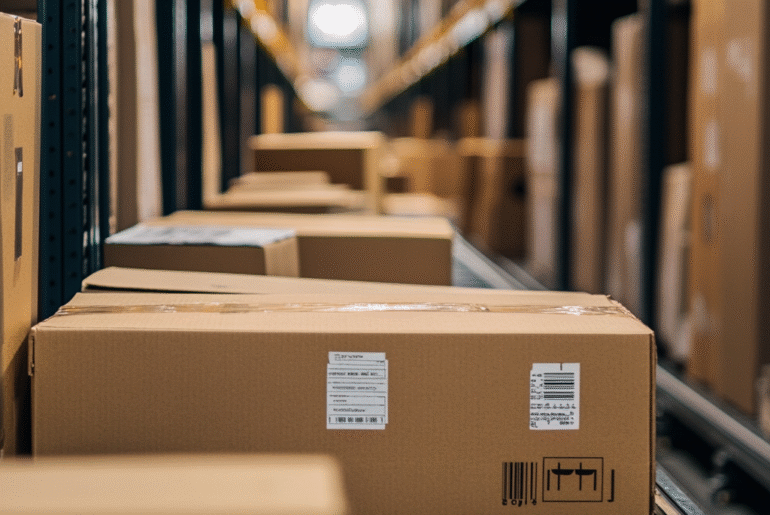This article may contain references to products or services from one or more of our advertisers or partners. We may receive compensation when you click on links to those products or services. Nonetheless, our opinions are our own.
The information presented in this article is accurate to the best of our knowledge at the time of publication. However, information is subject to change, and no guarantees are made about the continued accuracy or completeness of this content after its publication date.
Consumers can access products worldwide with just one click, bringing the newest devices and trends to their doorstep. But what happens when international trade policies change? Recent tariff adjustments are reshaping the cost of imported goods, making it essential for online shoppers to understand how these changes affect their wallets.
We’ll explain the impact of new tariffs, what they mean for everyday purchases, and practical strategies for managing costs effectively—whether you’re a seasoned shopper or just looking for deals.
- Understanding the Basics of Recent Tariff Changes
- How Tariffs Impact Your Favorite Online Stores
- Spotting Price Increases: What to Look For
- Strategies to Optimize Your Online Shopping Budget
- Alternative Shopping Options to Mitigate Tariff Effects
- Preparing Your Finances for Ongoing Tariff Changes
- Frequently Asked Questions
- What are the recent tariff changes affecting online shopping?
- How do these changes influence prices?
- Which products are most affected?
- Is it worth waiting for sales?
- How can I monitor relevant price changes?
- Will price changes be immediate?
- What should I consider before buying?
- Are there alternatives to avoid tariff-related price hikes?
- Recommended Reads
Understanding the Basics of Recent Tariff Changes
New tariff rules can significantly affect your online purchases, often unexpectedly. Import duties and handling fees are rising, making many foreign products pricier than before. Understanding how tariffs influence prices can help you stay on budget and make informed decisions.
Key points to remember:
- Price Increases: Imported goods may cost more due to added tariffs.
- Shipping Fees: Carriers could pass along higher costs to consumers.
- Longer Deliveries: Customs inspections might delay orders.
A quick price comparison can reveal how tariffs have changed product costs:
| Item | Old Price | New Price | Tariff Impact |
|---|---|---|---|
| Electronics | $500 | $550 | +10% |
| Clothing | $50 | $55 | +10% |
| Home Goods | $150 | $160 | +7% |
How Tariffs Impact Your Favorite Online Stores
Retailers affected by tariffs often adjust their pricing strategies. If you’ve noticed certain items becoming more expensive, especially those made with imported materials, it’s likely due to these changes.
Common effects include:
- Higher Prices: Electronics, clothing, and home goods may rise by 5%–25%.
- Shipping Adjustments: Stores might increase shipping rates to offset costs.
- Limited Availability: Some brands may be discontinued or have reduced inventory.
Here’s a general estimate of how tariffs might affect different product categories:
| Product Category | Potential Price Increase (%) |
|---|---|
| Electronics | 10–25% |
| Apparel | 5–15% |
| Household Goods | 7–20% |
Spotting Price Increases: What to Look For
Price tracking helps you stay alert to sudden increases and hidden fees. Some of the signs include:
- Similar items are rising in price at the same time
- Decreased availability of your go-to brands
- Unusual increases in delivery or handling fees
- Fewer promotional discounts
To stay informed, use price-tracking tools like CamelCamelCamel to monitor changes, especially on Amazon. You can also subscribe to retailer newsletters or set up deal alerts.
| Indicator | Action |
|---|---|
| Historical Price Data | Use tracking tools |
| Higher Shipping Costs | Reevaluate shipping preferences |
| Stock Availability | Explore alternative retailers |
Voted "Best Overall Budgeting App" by Forbes and WSJ
Monarch Money helps you budget, track spending, set goals, and plan your financial future—all in one app.
Get 50% OFF your first year with code MONARCHVIP
Strategies to Optimize Your Online Shopping Budget
Adapting to price fluctuations starts with smart habits. These proven strategies help you shop more efficiently:
- Coupon Websites: Always search for promo codes before checkout.
- Set Limits: Determine your spending budget in advance to avoid impulse purchases.
- Buy for Value: Invest in durable, long-term products to reduce replacement costs.
Additional money-saving tips:
| Tip | Description |
|---|---|
| Price Tracking Tools | Monitor product changes to buy at the lowest point |
| Subscription Discounts | Sign up for recurring purchase deals |
| Bulk Buying | Save on non-perishables by purchasing in large sizes |
Alternative Shopping Options to Mitigate Tariff Effects
If you want to reduce exposure to tariffs, consider these options:
- Local Retailers: Smaller stores might offer similar products without import-related markups.
- Domestic Brands: Support local businesses and avoid additional fees.
- Bulk Orders: Save on per-unit pricing by purchasing frequently used items in volume.
- Global Marketplaces: Browse various platforms to compare deals from international sellers unaffected by the same tariffs.
| Shopping Option | Benefits |
|---|---|
| Local Retailers | Community support, lower shipping costs |
| Domestic Brands | Avoid tariffs, support the national economy |
| Online Marketplaces | Greater variety, competitive pricing |
Preparing Your Finances for Ongoing Tariff Changes
As trade rules evolve, financial flexibility becomes even more critical. Here’s how to adjust your budget:
- Review Your Budget: Identify areas to reduce discretionary spending.
- Prioritize Needs: Focus first on essentials like groceries and household supplies.
- Explore New Sources: Local markets and bulk stores may offer better prices.
- Stay Updated: Monitor tariff-related news to anticipate product-specific price hikes.
Building a savings buffer also helps you handle rising costs:
| Expense Category | Current Budget | Suggested Buffer |
|---|---|---|
| Groceries | $400 | $100 |
| Clothing | $200 | $50 |
| Household Goods | $150 | $30 |
Frequently Asked Questions
What are the recent tariff changes affecting online shopping?
Recent changes have raised import duties on electronics, clothing, and home goods. The impact varies by country and category.
How do these changes influence prices?
Retailers often pass tariff-related costs on to consumers. Depending on product demand and sourcing, you may see gradual or sudden increases.
Which products are most affected?
Electronics, apparel, furniture, and items dependent on international supply chains are typically impacted first.
Is it worth waiting for sales?
Yes, especially during known sale events. However, predicting price drops during tariff shifts can be unreliable.
How can I monitor relevant price changes?
Use tools like CamelCamelCamel and store newsletters to track pricing and set alerts for your favorite items.
Will price changes be immediate?
Not always. Some retailers may absorb short-term costs while others adjust prices quickly.
What should I consider before buying?
Weigh the urgency of your need, potential price trends, and whether future tariff changes will likely hit the item.
Buying from domestic retailers, shopping during clearances, and exploring less-affected brands or platforms are effective workarounds.

Reviewed and edited by Albert Fang.
See a typo or want to suggest an edit/revision to the content? Use the contact us form to provide feedback.
At FangWallet, we value editorial integrity and open collaboration in curating quality content for readers to enjoy. Much appreciated for the assist.
Did you like our article and find it insightful? We encourage sharing the article link with family and friends to benefit as well - better yet, sharing on social media. Thank you for the support! 🍉
Article Title: What Today’s Tariff Changes Mean for Your Online Shopping Habit
https://fangwallet.com/2025/05/11/what-todays-tariff-changes-mean-for-your-online-shopping-habit/The FangWallet Promise
FangWallet is an editorially independent resource - founded on breaking down challenging financial concepts for anyone to understand since 2014. While we adhere to editorial integrity, note that this post may contain references to products from our partners.
The FangWallet promise is always to have your best interest in mind and be transparent and honest about the financial picture.
Become an Insider

Subscribe to get a free daily budget planner printable to help get your money on track!
Make passive money the right way. No spam.
Editorial Disclaimer: The editorial content on this page is not provided by any of the companies mentioned. The opinions expressed here are the author's alone.
The content of this website is for informational purposes only and does not represent investment advice, or an offer or solicitation to buy or sell any security, investment, or product. Investors are encouraged to do their own due diligence, and, if necessary, consult professional advising before making any investment decisions. Investing involves a high degree of risk, and financial losses may occur including the potential loss of principal.
Source Citation References:
+ Inspo
There are no additional citations or references to note for this article at this time.












































